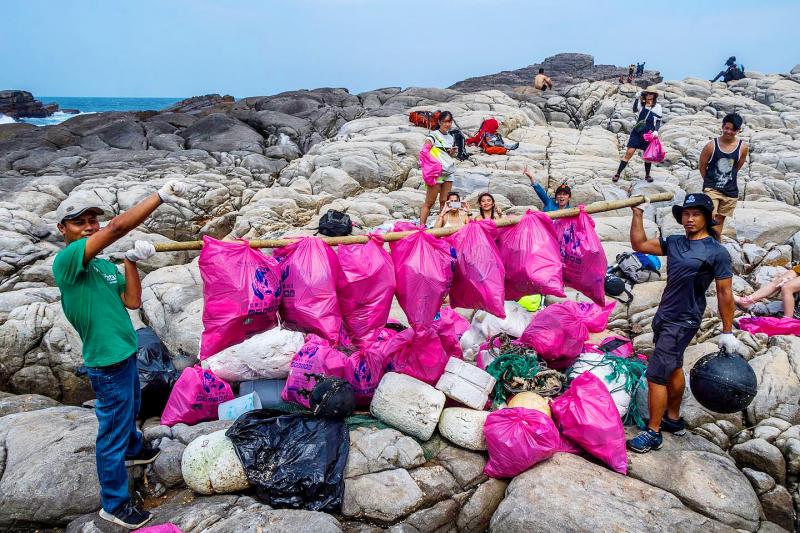In the opening months of this year, as coronavirus wreaked havoc on the global economy, environmentalists noticed an unexpected benefit of the pandemic. Amid national lockdowns and a sharp fall in demand for international travel, air pollution levels went into an unprecedented decline.
However, a World Economic Forum report published last month indicated that coronavirus’s effect on the environment has not been entirely positive. The report warned that an increase in demand for single-use plastics required for medical supplies, alongside reduced monitoring of waste disposal, “will have long-term impacts on the environment.”
Despite success in controlling the spread of coronavirus, Taiwan is not exempt from these emerging environmental challenges. It is against this background that volunteers will take to Taiwan’s beaches and forests tomorrow for the Taiwan National Clean Up Day.

Photo courtesy of Taiwan National Clean Up
This will be the fourth year of the nationwide event, which has now expanded to 22 locations including Penghu (澎湖) and Miaoli (苗栗) counties and Taitung County’s Dulan Village (都蘭). An expected 1,000 volunteers will take part collecting close to 10 tons of garbage.
Ryan Hevern, the American co-founder of the event, underscored the importance of this year’s clean-up and urged against equating the dip in tourism due to coronavirus, with a fall in the volume of garbage they expect to collect.
While admitting the organization anticipated finding less sky lanterns littering the forests near tourist hot-spots Shifen (十分) and Pingxi (平溪), Hevern emphasized that coronavirus would have “no effect whatsoever” on the amount of garbage they would find on Taiwan’s beaches.
A crucial reason behind this is the garbage’s wide range of sources, of which the local fishing industry is a major contributor. Beyond the expected plastic containers, previous volunteers combing the beaches have found rope, netting and even refrigerators.
Another key dimension is that a significant proportion of the garbage is international in origin. Plastic bottles brought by ocean currents to Taiwan’s beaches often come from places as far away as China, Vietnam and Indonesia.
For Philip Chang (張上緒), a volunteer who has joined every year, it is finding garbage like this that re-affirms the importance of the event. This year, he will help clean up Jinshan Beach (金山).
Chang says that when you begin finding garbage from other countries, you “realize the global nature of this problem.” In turn, this has an impact on the Taiwanese participants themselves, in cultivating a sense of “global citizenship.”
As the world transitions out of the coronavirus crisis, projects like National Clean Up Day will only increase in importance. They will be vital in drawing attention to and redressing the increased volume of plastic waste caused by the pandemic.
For Chang, raising awareness within communities is the crucial first step. Because once the problem is recognized, he continues, “you feel a sense of accountability toward solving it.”
For more details, go to Facebook page: Taiwan National Clean Up Day.

Climate change, political headwinds and diverging market dynamics around the world have pushed coffee prices to fresh records, jacking up the cost of your everyday brew or a barista’s signature macchiato. While the current hot streak may calm down in the coming months, experts and industry insiders expect volatility will remain the watchword, giving little visibility for producers — two-thirds of whom farm parcels of less than one hectare. METEORIC RISE The price of arabica beans listed in New York surged by 90 percent last year, smashing on Dec. 10 a record dating from 1977 — US$3.48 per pound. Robusta prices have

The resignation of Taiwan People’s Party (TPP) co-founder Ko Wen-je (柯文哲) as party chair on Jan. 1 has led to an interesting battle between two leading party figures, Huang Kuo-chang (黃國昌) and Tsai Pi-ru (蔡壁如). For years the party has been a one-man show, but with Ko being held incommunicado while on trial for corruption, the new chair’s leadership could be make or break for the young party. Not only are the two very different in style, their backgrounds are very different. Tsai is a co-founder of the TPP and has been with Ko from the very beginning. Huang has

A few years ago, getting a visa to visit China was a “ball ache,” says Kate Murray. The Australian was going for a four-day trade show, but the visa required a formal invitation from the organizers and what felt like “a thousand forms.” “They wanted so many details about your life and personal life,” she tells the Guardian. “The paperwork was bonkers.” But were she to go back again now, Murray could just jump on the plane. Australians are among citizens of almost 40 countries for which China now waives visas for business, tourism or family visits for up to four weeks. It’s

A dozen excited 10-year-olds are bouncing in their chairs. The small classroom’s walls are lined with racks of wetsuits and water equipment, and decorated with posters of turtles. But the students’ eyes are trained on their teacher, Tseng Ching-ming, describing the currents and sea conditions at nearby Banana Bay, where they’ll soon be going. “Today you have one mission: to take off your equipment and float in the water,” he says. Some of the kids grin, nervously. They don’t know it, but the students from Kenting-Eluan elementary school on Taiwan’s southernmost point, are rare among their peers and predecessors. Despite most of